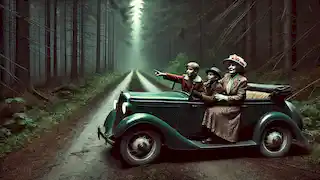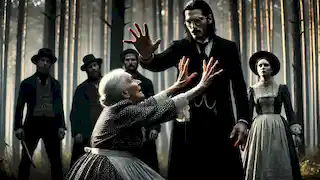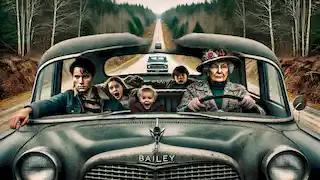The grandmother didn’t want to go to Florida. She wanted to visit some of her connections in east Tennessee, and she was seizing every chance to change Bailey’s mind. Bailey was her only son, and he was sitting at the table with his wife, who didn’t say much, and their two children, John Wesley, eight years old, and June Star, who was younger but equally energetic. Bailey’s wife, a young woman in slacks, her face broad and innocent like cabbage, was feeding the baby. The grandmother noticed she had forgotten to bring the cat inside, and she didn’t like leaving Pitty Sing alone in the house for three days.
She sat in the living room, dressed in a fine hat with flowers and lace, ready to leave. “The children have been to Florida before,” she said. “You all ought to take them somewhere else for a change, so they would see different parts of the world and be broad. They’ve never been to east Tennessee.”
Bailey didn’t even look up from his reading.
The children, who were as restless as wild animals, did not seem interested in her proposal either. John Wesley, who was eight and energetic, kicked his sister June Star’s chair.
“I wouldn't live in a broken-down place like Tennessee,” June Star said.
The grandmother was appalled at the lack of manners and good upbringing in children today. She huffed and changed her tack. “Did you read here that the Misfit is loose from the Federal Pen and headed toward Florida? I wouldn’t take my children in any direction with a criminal on the loose. I couldn’t answer to my conscience if I did.”
Bailey’s wife didn’t comment, and neither did Bailey. The grandmother settled back into her chair, feeling satisfied that she had made her point.
The next morning, they set out for Florida anyway, with the grandmother in the back seat, surrounded by bags and pillows. She dressed in her best outfit, complete with a hat and gloves, so that if they had an accident, anyone who saw her dead on the highway would know she was a lady. The children were already quarreling in the back seat, and Bailey drove the car silently, his face set in irritation.
As they drove through the countryside, the grandmother began to tell stories about her youth. “In my day,” she said, “children were more respectful of their elders, and people did things for each other. A good man was hard to find in those days too, but at least you knew who they were.”
The children quickly grew bored of her reminiscences. John Wesley kicked the front seat, and June Star, her bright eyes sparkling with mischief, said, “Let's go see the house with the secret panel.”
“What house?” the grandmother asked, genuinely curious.
“The one you told us about,” June Star said. “The one with the secret panel where they used to hide all the silver.”
The grandmother realized too late that she had made a mistake. “Oh yes,” she said, remembering now, “it's not far from here.”
Bailey sighed in exasperation but said nothing. The grandmother gave him the directions, and they turned down a narrow dirt road that wound through the woods.

As they drove deeper into the forest, the grandmother suddenly realized something. “Oh dear,” she said. “I just remembered. The house with the secret panel is in Tennessee, not Georgia.”
Bailey slammed on the brakes. “We’re turning around,” he said flatly.
Just then, the car hit a bump, and the grandmother's cat, Pitty Sing, who had been hiding in a basket the whole time, leaped out in a panic. Bailey lost control of the car, and it swerved off the road and flipped over in a shallow ditch.
The car was badly damaged, but no one was seriously hurt. The grandmother was shaken, and the children were crying, but Bailey seemed ready to explode with anger.
“We’re in a terrible place,” the grandmother said, clutching her hat.
A car approached from the road, and three men got out. They were rough-looking, dressed in shabby clothes. The tallest one, who seemed to be the leader, wore spectacles and had a calm, eerie demeanor.
“Good afternoon,” the man said. “Looks like you all had a bit of trouble.”
“We’re fine,” Bailey said tersely.
The grandmother recognized the man immediately. “You’re the Misfit!” she said.
The man looked at her. “Yes, ma’am,” he said, “but it’d be better if you hadn’t recognized me.”
Bailey’s wife began to cry softly, holding the baby tightly to her chest. The grandmother, realizing the gravity of the situation, tried to appeal to the Misfit’s better nature.
“I know you’re a good man,” she said. “You wouldn’t shoot a lady, would you?”
The Misfit smiled, but it was a sad smile, full of regret. “I’m afraid I don’t know what a good man is anymore,” he said.
He turned to his two companions. “Take them into the woods,” he said, pointing to Bailey and the children.

The grandmother watched in horror as they were led away. She could hear the shots in the distance, each one sending a chill through her body. She turned back to the Misfit, desperate to save herself.
“Pray,” she said. “Pray to Jesus.”
The Misfit looked thoughtful. “Jesus threw everything off balance,” he said. “If He did what they say, then there’s nothing for you to do but throw away everything and follow Him. If He didn’t, then it’s nothing but meanness.”
The grandmother, trembling, reached out to him. “You’re one of my own children!” she said. Her voice was trembling, her mind disoriented. She touched his shoulder.
The Misfit recoiled, as if burned. He stepped back and fired three shots into her chest.
She slumped to the ground, her face serene, as if she had found peace in that final moment.
The Misfit stood over her. His face was solemn. “She would have been a good woman,” he said, “if it had been somebody there to shoot her every minute of her life.”
His companion said nothing as they walked back to the car.
The story ends with the Misfit and his companions driving away, leaving behind the wreckage of the family’s trip and the broken ideals of what constitutes goodness and decency in the world.

Flannery O'Connor's *"A Good Man is Hard to Find"* is a grim tale of morality, examining the complex interactions between grace, goodness, and the inherent flaws within human nature. The grandmother's desperate appeals to the Misfit reflect her own hypocrisy and the illusion of moral superiority, which crumbles when faced with true danger. The Misfit, though a villain, is a man deeply troubled by the nature of good and evil, living a life where meanness seems to be the only certainty.
In the end, the grandmother’s moment of grace, where she reaches out to touch the Misfit as if recognizing their shared humanity, is a powerful and ambiguous conclusion to her journey. Her realization of their shared fallibility, followed by her death, serves as the story’s tragic and redemptive moment.
The Misfit’s final words encapsulate O'Connor’s theme—that human beings, whether good or evil, are capable of moments of grace, but these moments are fleeting and often born out of desperation or fear. The grandmother’s life, so consumed by outward appearances and moral posturing, only achieves something resembling true grace when she faces the Misfit, whose own struggle with morality reveals the depth of his inner torment.
The story’s sharp contrast between the grandmother’s superficial understanding of goodness and the Misfit’s existential reflection on the nature of sin and redemption challenges the reader to consider the complexities of morality in a world where, as the title suggests, a truly good man is indeed hard to find.



















